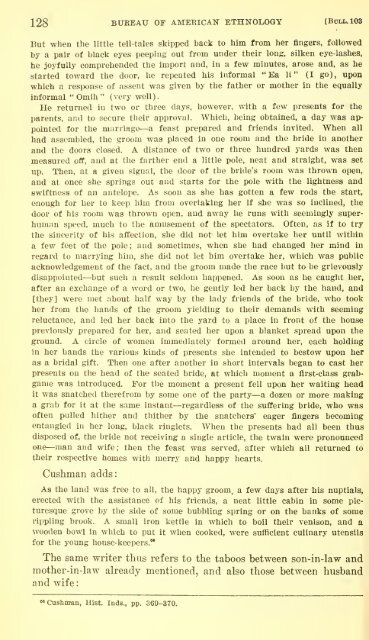siOBX; - Smithsonian Institution
siOBX; - Smithsonian Institution
siOBX; - Smithsonian Institution
You also want an ePaper? Increase the reach of your titles
YUMPU automatically turns print PDFs into web optimized ePapers that Google loves.
128 BUREAU OF AMERICAN ETHNOLOGY [Boll. 103<br />
But when the little tell-tales skipped back to him from her fingers, followed<br />
by a pair of black eyes peeping out from under their long, silken eye-lashes,<br />
he joyfully comprehended the import and, in a few minutes, arose and, as he<br />
started toward the door, he repeated his informal "Ea 11" (I go), upon<br />
which a resix)use of assent was given by the father or mother in the equally<br />
informal " Oraih " (very well).<br />
He returned in two or three days, however, with a few presents for the<br />
parents, and to secure their approval. Which, being obtained, a day was ap-<br />
pointed for the marriage—a feast prepared and friends invited. When all<br />
had assembled, the groom was placed in one room and the bride in another<br />
and the doors closed. A distance of two or three hundred yards was then<br />
measured off, and at the farther end a little pole, neat and straight, was set<br />
up. Then, at a given signal, the door of the bride's room was thrown open,<br />
and at once she springs out and starts for the pole with the lightness and<br />
swiftness of an antelope. As soon as she has gotten a few rods the start,<br />
enough for her to keep him from overtaking her if she was so inclined, the<br />
door of his room was thrown open, and away he runs with seemingly superhuman<br />
speed, much to tlie amusement of the spectators. Often, as if to try<br />
the sincerity of his affection, she did not let him overtake her until within<br />
a few feet of the pole ; and sometimes, when she had changed her mind in<br />
regard to marrying him, she did not let him overtake her, which was public<br />
acknowledgement of the fact, and the groom made the race but to be grievously<br />
disappointed—but such a result seldom happened. As soon as he caught her,<br />
after an exchange of a word or two, he gently led her back by the hand, and<br />
[they] were met about half way by the lady friends of the bride, who took<br />
her from the hands of the groom yielding to their demands with seeming<br />
reluctance, and led her back into the yard to a place in front of the house<br />
previously prepared for her, and seated her upon a blanket spread upon the<br />
ground. A circle of women immediately formed around her, each holding<br />
in her hands the various kinds of presents she intended to bestow upon her<br />
as a bridal gift. Then one after another in short intervals began to cast her<br />
presents on the head of the seated bride, at which moment a first-class grabgame<br />
was introduced. For the moment a present fell upon her waiting head<br />
it was snatched therefrom by some one of the party—a dozen or more making<br />
a grab for it at the same instant—regardless of the suffering bride, who was<br />
often pulled hither and thither by the snatchers' eager fingers becoming<br />
entangled in her long, black ringlets. When the presents had all been thus<br />
disposed of, the bride not receiving a single article, the twain were pronounced<br />
one—man and wife; then the feast was served, after which all returned to<br />
their respective homes with merry and happy hearts.<br />
Cushman adds<br />
As the land was free to all, the happy groom, a few days after his nuptials,<br />
erected with the assistance of his friends, a neat little cabin in some picturesque<br />
grove by the side of some bubbling spring or on the banks of some<br />
rippling brook. A small iron kettle in which to boil their venison, and a<br />
wooden bowl in which to put it when cooked, were sufficient culinary utensils<br />
for the young house-keepers."<br />
The same writer thus refers to the taboos between son-in-law and<br />
mother-in-law already mentioned, and also those between husband<br />
and wife<br />
«« Cushman, Hist. Inds., pp. 369-370.

















